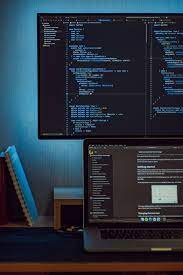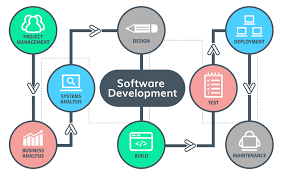Exploring the Intersection of Programming and Software Development
Programming and Software Development: A Gateway to Innovation
In today’s digital age, programming and software development play a crucial role in shaping the world around us. From mobile apps to complex algorithms, the realm of programming offers endless possibilities for innovation and problem-solving.
The Art of Coding
At its core, programming is the art of instructing computers to perform specific tasks through the use of languages like Java, Python, C++, and more. Software development, on the other hand, involves designing, creating, and maintaining applications that cater to various needs and industries.
The Power of Problem-Solving
Programmers and software developers are modern-day problem solvers. They analyze challenges, conceptualize solutions, and translate ideas into functional code. Whether it’s developing a new feature for a website or optimizing a database system, their skills drive technological advancements across all sectors.
The Evolution of Technology
As technology continues to evolve at a rapid pace, so do the demands placed on programmers and software developers. The rise of artificial intelligence, machine learning, and cloud computing has opened up new frontiers for innovation. These advancements not only enhance user experiences but also streamline business operations.
Coding Communities and Collaboration
One of the most remarkable aspects of programming is its collaborative nature. Developers often work together in online forums, open-source projects, and hackathons to share knowledge and build upon each other’s ideas. This sense of community fosters creativity and drives progress in the field.
The Future of Programming
Looking ahead, the future of programming holds endless possibilities. From quantum computing to Internet-of-Things (IoT) devices, there is no limit to what can be achieved through innovative coding practices. As we embrace emerging technologies, programmers and software developers will continue to shape our digital landscape for years to come.
9 Essential Tips for Effective Programming and Software Development
- Write clean and readable code for easier maintenance
- Use version control systems like Git to track changes
- Document your code to help others understand its functionality
- Practice test-driven development to ensure code reliability
- Stay updated with the latest programming languages and tools
- Collaborate with other developers to learn new techniques and best practices
- Optimize code for efficiency and performance when necessary
- Follow design patterns to create scalable and maintainable software
- Take breaks and rest periodically to prevent burnout
Write clean and readable code for easier maintenance
Writing clean and readable code is a fundamental tip in programming and software development that significantly impacts the ease of maintenance. By following this practice, developers can enhance the clarity and organization of their code, making it easier for themselves and others to understand, modify, and debug in the future. Clean code reduces the likelihood of errors, improves efficiency during maintenance tasks, and ultimately contributes to the long-term sustainability of a software project.
Use version control systems like Git to track changes
Utilizing version control systems like Git is essential in programming and software development. By implementing Git, developers can easily track changes made to their codebase, collaborate effectively with team members, and revert to previous versions if needed. This practice not only ensures project integrity but also promotes efficient workflow management and seamless code deployment. Embracing version control systems like Git empowers developers to maintain a structured development environment and enhance productivity throughout the software development lifecycle.
Document your code to help others understand its functionality
Documenting your code is a crucial practice in programming and software development. By providing clear and concise explanations within the codebase, developers can help others understand the functionality, purpose, and logic behind each component. This not only facilitates collaboration among team members but also ensures that future modifications or troubleshooting efforts are more efficient and effective. Well-documented code serves as a valuable resource for both present and future stakeholders, fostering better comprehension and maintenance of the software system as a whole.
Practice test-driven development to ensure code reliability
By practicing test-driven development in programming and software development, developers can enhance the reliability of their code. This approach involves writing tests for specific functionalities before writing the actual code, ensuring that the code meets the desired requirements and functions correctly. By continuously running these tests throughout the development process, developers can identify and fix potential issues early on, leading to more robust and stable software solutions.
Stay updated with the latest programming languages and tools
Staying updated with the latest programming languages and tools is essential for programmers and software developers to remain competitive and relevant in the ever-evolving tech industry. By keeping abreast of new languages, frameworks, and tools, professionals can enhance their skill set, improve efficiency in their work, and adapt to changing trends and demands. Continuous learning and exploration of emerging technologies not only broaden one’s knowledge but also open up new opportunities for innovation and growth in the dynamic world of programming and software development.
Collaborate with other developers to learn new techniques and best practices
Collaborating with other developers is a valuable tip in the world of programming and software development. By working together with peers, you can gain insights into new techniques and best practices that you may not have encountered on your own. Through collaboration, you have the opportunity to learn from others’ experiences, share knowledge, and collectively enhance your skills in the ever-evolving field of technology. Embracing teamwork and collaboration not only fosters a sense of community but also accelerates personal growth and proficiency in coding.
Optimize code for efficiency and performance when necessary
Optimizing code for efficiency and performance is a critical aspect of programming and software development. By carefully analyzing and refining the code, developers can enhance the speed, responsiveness, and overall quality of their applications. Whether it involves reducing processing time, minimizing memory usage, or improving algorithmic complexity, optimizing code ensures that the software operates smoothly and delivers a seamless user experience. Prioritizing efficiency not only boosts performance but also showcases a commitment to excellence in crafting robust and reliable solutions for users.
Follow design patterns to create scalable and maintainable software
Following design patterns is a fundamental tip in programming and software development that can greatly enhance the scalability and maintainability of your software. By adhering to established design patterns such as MVC (Model-View-Controller) or Singleton, developers can create code that is easier to understand, modify, and extend. Design patterns provide proven solutions to common design problems, allowing for more efficient development and better organization of code. Incorporating design patterns into your software development process not only improves the quality of your code but also facilitates collaboration among team members and ensures long-term sustainability of the software product.
Take breaks and rest periodically to prevent burnout
Taking breaks and resting periodically is essential in the world of programming and software development to prevent burnout. Constantly engaging with complex coding tasks and problem-solving can be mentally taxing, leading to decreased productivity and creativity over time. By incorporating regular breaks into your work routine, you give your mind the opportunity to recharge and refocus, ultimately improving your overall performance. Remember, a well-rested programmer is a more effective programmer in the long run.




